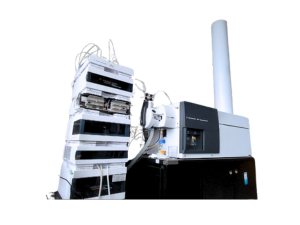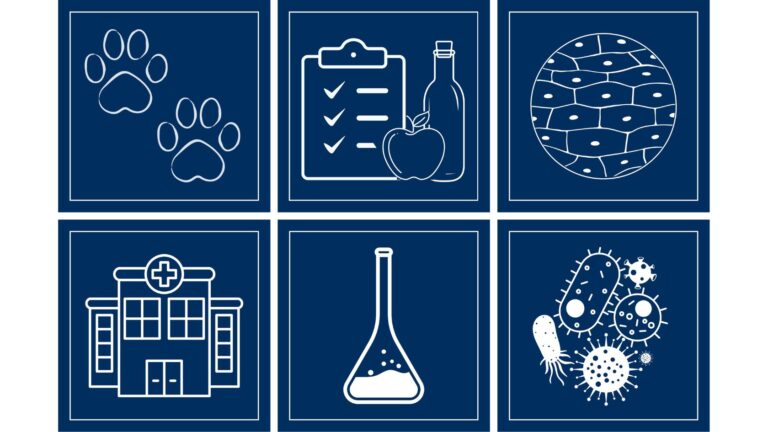
metabolomics
About Us
The metabolomics infrastructure presents a whole setup of advanced and complementary technologies for mass-spectrometry and other services, providing high data quality and versatile packages for metabolic profiling to suit your needs.
Mass-spectrometry is a well-established technology for studying metabolic changes by detecting the metabolites related to the physio-pathological state of the cell, tissue, or organism within the context of the environmental condition, genetic regulation, altered kinetic activity of enzymes, and changes in metabolic reactions.
Metabolomics profiling identifies thousands of metabolites generated by the enzymatic reactions of specific pathways, providing a snapshot of cell activity such as cell signaling, energy transfer, and cell-to-cell communication. Alternative metabolic pathways due to environmental adaptation or acquired drug resistance may be identified using labeled substrates (stable isotope tracers).

Applications
Our metabolomics services apply to a variety of samples and research studies. Depending on what you are looking for, we can suggest the best approach to find answers to your research questions.
Metabolomics mass spectrometry analyses apply to a variety of research studies and samples. Explore the possibilities and contact us to discuss your design ideas.

Animal

Animal
The interdependence between humans, animals and the environment are of particular importance today, with the dramatic emergence and spread of zoonotic diseases, food, water and soil contamination, and the degradation of resources and habitats. All these events have led to an increase of risk factors for functional diseases, burdening global health. Metabolomics represents a technical solution for a holistic, collaborative, and precise approach for the advancement of the One Health strategy.
Nutrition

Nutrition
Understanding the paths of basic nutrients is of importance from both translational and clinical perspectives. Metabolites are key biological communication channels and represent a functional readout at the interface of different major influential factors that define health and disease. Metabolomics is the technology that enables holistic and systematic analyses of metabolites in a biological system. Hence, given its intrinsic functionality, its tight connection to metabolism and its high clinical actionability potential, metabolomics is a very appealing technology for nutrition science. The ultimate goal is to deliver a tailored and clinically relevant nutritional recommendations and interventions to achieve precision nutrition. Metabolomics applications can be used to identify bioactive molecules and personalize nutrition remodeling clinical nutrition practices in this Precision Medicine era.
Cells

Cells
Cell metabolomics is an emerging field that addresses fundamental biological questions and allows one to observe metabolic phenomena in cells. Cell metabolomics consists of four sequential steps: (a) sample preparation and extraction, (b) metabolic profiles of low-weight metabolites based on MS techniques, (c) pattern recognition approaches and bioinformatics data analysis, (d) metabolites identification resulting in putative biomarkers and molecular targets. The biomarkers are eventually placed in metabolic networks to provide insight on the cellular biochemical phenomena.
Clinical

Clinical
Clinical metabolomics is able to illustrate an instantaneous snapshot of an individual by revealing the compound variety and concentrations of the metabolome. The unique metabolomic fingerprints and the underlying perturbations of metabolic pathways at the pathophysiological state offers a comprehensive avenue to inquire potential indicators, the metabolic phenotype of various diseases, and ultimately help address precision medicine.
Metabolomics can be applied to improve human health, as well as its trends and impacts in metabolic and neurodegenerative diseases, cancer, longevity, the exposome, liquid biopsy development, and pharmaco-metabolomics. The identification of distinct metabolomic profiles will help in the discovery and improvement of clinical strategies to treat human disease.
In the tumor research, metabolomics can be employed to identify biomarkers for prediction, diagnosis, and prognosis. Chemotherapeutic effect evaluation and personalized medicine decision-making can also benefit from metabolomic analysis of patient biofluid or biopsy samples.
Fermentation

Fermentation
Metabolomics mass spectrometry analysis can be used to study fermented samples to understand how different conditions alter the metabolism of the bacteria and yeast, crucial information about nutrient compounds, and product accumulation.
Microbiome

Microbiome
The human microbiome plays an important role in our health and its composition and functionality is influenced by a variety of factors such as nutrition, environmental and pharmaceutical exposures, stress, and lifestyle. Metabolomics can be applied to elucidate the link between the human microbiome and the metabolism of various cell types.
Facility
UHPLC/ Q-TOF MS
GC/MS
Ion Mobility UHPLC/Q-TOF MS
GC/Q-TOF MS
LC/QqQ MS
SeaHorse XF24 Analyzer
YSI 2950 Biochemistry Analyzer
TapeStation 4150
SureScan Microarray Scanner
Services
Untargeted metabolomics analysis allows the simultaneous measurement of a large number of metabolites from each sample. This approach avoids the need for a prior specific hypothesis on a particular set of metabolites and, instead, analyses the global metabolomic profile. The untargeted analysis reflects the multiple dynamic responses of living organisms to external stimuli, pathophysiological changes, and their own gene mutations in metabolite levels in vivo, and it offers the opportunity for novel target discovery.
Targeted metabolomics measures defined groups of chemically characterized and biochemically annotated metabolites, showing new possible associations between metabolites in specific physiological states. This approach allows quantitative and semi-quantitative identification of metabolites in the sample (including organic acids, amino acids, nucleotides, lipids, and more), taking advantage of the comprehensive understanding of a vast array of metabolic enzymes, their kinetics, end products, and the known biochemical pathways to which they contribute.
Combining the targeted analysis and specific tracer molecules allows for identifying where metabolites end up in the biological system, opening new possible scenarios of altered metabolic pathways that drive diseases such as cancer, neurodegeneration, cardiomyopathy, diabetes, etc.
